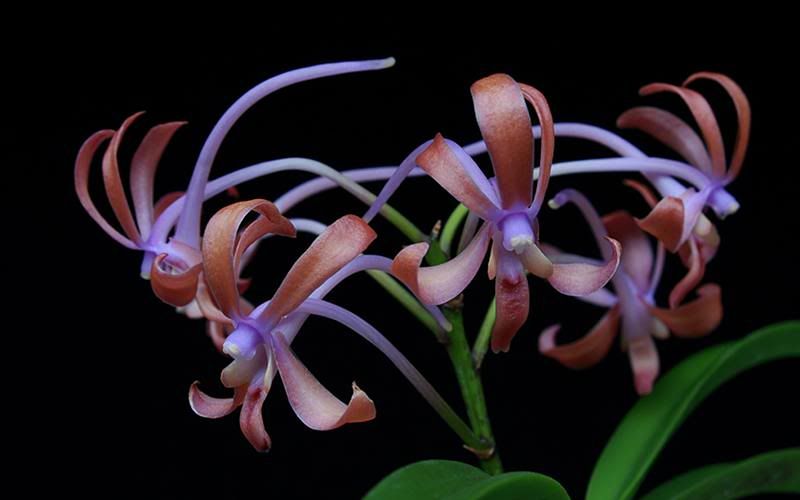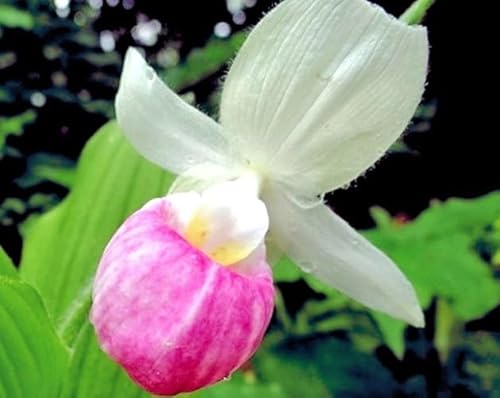Wow. Never seen the like and I follow all the fukiran stuff. Wonder if it’s available?One way to tell if Ascocentrum is involved is spur length - the shorter it is, the more likely you've got a hybrid. Of course with complex back crossing the spur length can increase. Here's a little beauty I picked up this summer with only the fanciful name 'Aochatsuki' (Blue Tea Moon). It was being sold alongside fuukiran at a local nursery:

Definitely a hybrid, but what a beauty! Those are the real colors.
You are using an out of date browser. It may not display this or other websites correctly.
You should upgrade or use an alternative browser.
You should upgrade or use an alternative browser.

Help Support Slippertalk Orchid Forum:
This site may earn a commission from merchant affiliate
links, including eBay, Amazon, and others.
KyushuCalanthe
Just call me Tom
- Joined
- Jan 12, 2008
- Messages
- 8,280
- Reaction score
- 585
I still have piece of that plant, and the flower color varies from year to year. I guess a function of temperature? At any rate, this is just a hybrid with some other Vanda species, and should not be considered a "real" fuukiran. Many plants like this are produced en masse and sold at relatively cheap prices in retail nurseries. It would be fun to go peruse the greenhouses of Seed Engei and pick out cool looking ones, but they aren't open to the public. BTW, the naming of plants is pretty loose, so they can be named just about anything the grower fancies. The process of registering a recognized fuukiran is much more involved.
- Joined
- Jun 6, 2006
- Messages
- 10,874
- Reaction score
- 322
Someone just posted about looking for this in the Neo group on FB….a couple people mentioned they had pieces of it.
lol ‘‘twas I.Someone just posted about looking for this in the Neo group on FB….a couple people mentioned they had pieces of it.
I'll jump in here and ask something similar to what I asked on the OrchidBoard: is there any sort of predictability for mutations of flower when breeding with other Neos or even other Vandas?
The example I give (and is probably wishful thinking on my part) is with "Soubiryu" (双尾龍), which has a double lip and two nectar spurs. Be it if you cross "Soubiryu" with some colored flowered Neo or some other Vanda, is there really any chance that you could wind up with a plant with either 2 spurs or 2 "lips" or even both?
It seems like there's a few flower mutations that are more easily transferable from the parent to the offspring, as compared to variegation or some other leaf mutations, but I don't really know because I've never breed any plants before.
The example I give (and is probably wishful thinking on my part) is with "Soubiryu" (双尾龍), which has a double lip and two nectar spurs. Be it if you cross "Soubiryu" with some colored flowered Neo or some other Vanda, is there really any chance that you could wind up with a plant with either 2 spurs or 2 "lips" or even both?
It seems like there's a few flower mutations that are more easily transferable from the parent to the offspring, as compared to variegation or some other leaf mutations, but I don't really know because I've never breed any plants before.
KyushuCalanthe
Just call me Tom
- Joined
- Jan 12, 2008
- Messages
- 8,280
- Reaction score
- 585
Without speaking outside the range of my knowledge, the answer is "maybe". Certainly flower mutations can be passed onto offspring if crossing is done within the species. There are many 'Seikai' look-a-likes to demonstrate that. Flower color as well can be preserved. Leaf variegation is another matter. But I have reached the limit of what I think I know, so I'll stop. One thing is sure, if you do get into growing them from seed, you'll want to have several decades of life ahead of you since these guys are painfully slow from flask to flowering size.

$18.88 ($0.24 / Fl Oz)
$23.96 ($0.30 / Fl Oz)
Caress Body Wash for Women, Black Orchid & Patchouli Oil, Relaxing, Fragrant Shower Gel to Relax and Recharge, 20 fl oz, 4 Pack
Amazon.com

$52.00 ($52.00 / Fl Oz)
Magnolia Orchid Aloe Enzyme Facial Exfoliator for All Skin Types, 17 Fl Oz/500 mL
Home Destination

$14.98
$19.98
Nlife Bring On The Sunshine Graphic Short Sleeves Tees Blouses for Women Tops Sweaters for Women
waltzmart

$45.98 ($45.98 / Count)
$49.89 ($49.89 / Count)
hypehouse Allen + roth 8 in. Orchid Pot with Saucer White
Soko One

$25.49
$44.00
Understanding Orchids: An Uncomplicated Guide to Growing the World's Most Exotic Plants
Amazon.com

$7.79 ($0.97 / Fl Oz)
$10.99 ($1.37 / Fl Oz)
SheaMoisture Bath, Body and Massage Oil Lavender Wild Orchid Calming Moisturizer for Sensitive Skin 8 oz
Amazon.com

$16.13
$22.95
The Orchid Whisperer: Expert Secrets for Growing Beautiful Orchids (-)
Amazon.com

$11.99 ($0.12 / Count)
CHUXAY GARDEN Cypripedioideae-Lady's Slipper Orchids,Lady Slipper Orchids 100 Seeds Tropical Exotic Orchids Rare Small Orchid
color green

$22.62 ($6.65 / Fl Oz)
$26.90 ($7.91 / Fl Oz)
Vera Wang Princess Eau de Toilette Spray for Women, Vanilla, 3.4 Fl Ounce
Amazon.com
- Joined
- Jun 6, 2006
- Messages
- 10,874
- Reaction score
- 322
Tom, do you recall who you got this from? The person in the US who has one of these did not realize there was another anywhere and that you had one and thought you might have gotten it from Don Brown but I thought you got it at a market or something…I still have piece of that plant, and the flower color varies from year to year. I guess a function of temperature? At any rate, this is just a hybrid with some other Vanda species, and should not be considered a "real" fuukiran. Many plants like this are produced en masse and sold at relatively cheap prices in retail nurseries. It would be fun to go peruse the greenhouses of Seed Engei and pick out cool looking ones, but they aren't open to the public. BTW, the naming of plants is pretty loose, so they can be named just about anything the grower fancies. The process of registering a recognized fuukiran is much more involved.
KyushuCalanthe
Just call me Tom
- Joined
- Jan 12, 2008
- Messages
- 8,280
- Reaction score
- 585
Heather, I got it at a local nursery that sells high end retail plants. I used to see quite a few V. falcata and its hybrids for sale around town at nurseries and seasonal festivals. They mostly have disappeared recently. This is no doubt a plant grown up by Seed back in the day. They import thousands of plants from Korea, and likely this was from a lot labeled "Blue Tea Moon". I have never been able to find any reference to it on the web, so my guess it was a one-off. I guess a few got exported to the US market as well.
Similar threads
- Replies
- 13
- Views
- 2K
- Replies
- 13
- Views
- 2K
- Replies
- 14
- Views
- 3K
- Replies
- 0
- Views
- 5K


































